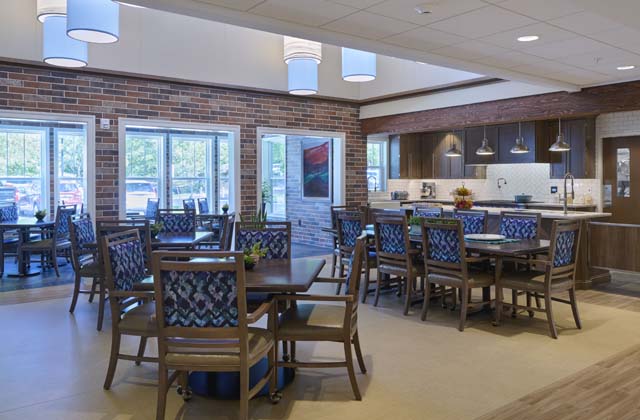The Benefits of Choosing Boutique Memory Care for Aging Parents
The Benefits of Choosing Boutique Memory Care for Aging Parents
Blog Article
Everything About Memory Care Services: Why Small Memory Care Homes Are a Fantastic Selection
Memory treatment services play an important role in sustaining individuals with Alzheimer's and dementia. Little memory treatment homes stick out for their tailored strategy and intimate setup. With lower staff-to-resident ratios, these homes promote stronger links and customized care. Citizens gain from enhanced social interactions and a safe atmosphere. As family members check out options, understanding the unique benefits of small memory treatment homes ends up being vital. What variables should be thought about when choosing the best home?
Understanding Memory Care Services
While several might be acquainted with basic elderly care options, recognizing memory care services is important for households dealing with the challenges of cognitive decline. Memory treatment particularly accommodates individuals with problems such as Alzheimer's illness and various other kinds of dementia. These services provide an organized environment that concentrates on boosting the lifestyle for locals through specialized care and support.Memory treatment centers are made to guarantee safety and security and protection, frequently including safeguarded environments to stop straying. Educated team member are readily available all the time to aid with daily tasks, medicine management, and personal care. In addition, memory treatment programs often include cognitive stimulation tasks, customized to involve homeowners and promote mental health. Households can profit from recognizing these solutions, as they enable educated choices concerning their loved ones' care, guaranteeing that their certain demands and choices are resolved in a compassionate and helpful manner.
The Advantages of Little Memory Care Houses
Tiny memory care homes provide unique advantages that can significantly improve the high quality of life for citizens with cognitive problems. One significant advantage is the intimate environment, which permits individualized communications among team and locals. This smaller sized setup promotes significant connections, minimizing sensations of isolation and anxiety frequently experienced by people with memory issues.Additionally, the reduced staff-to-resident proportion in tiny memory care homes allows caregivers to provide even more alert supervision and support. This strategy not only boosts safety and security yet additionally advertises a complacency for the residents.Moreover, tiny memory care homes can adjust promptly to the special needs and choices of each local, enabling an extra homelike ambience. Such an atmosphere can motivate social engagement and participation in activities, ultimately enriching the everyday experiences of those dealing with cognitive impairments.
Personalized Treatment Program for Residents
Individualized care strategies are vital in memory treatment homes, as they provide to the special requirements and preferences of each local. These plans start with thorough analyses performed by proficient experts, that examine cognitive capacities, case history, and individual interests. This tailored method warranties that care is not just effective yet likewise considerate of each person's self-respect and autonomy.Moreover, personalized care plans are adaptable, allowing modifications as homeowners' needs progress in time. This versatility promotes a feeling of protection and experience, which is vital for individuals living with memory challenges. Caregivers are trained to carry out these plans regularly, giving support that aligns with the homeowners' regimens and preferences.Ultimately, individualized care plans boost the quality of life for locals by promoting freedom, interaction, and wellness, making them a basic facet of memory care services in little memory treatment homes.
Producing a Home-Like Setting
Developing a home-like setting is vital for cultivating convenience and familiarity in memory care setups, as it greatly influences residents' psychological wellness. Small memory treatment homes typically prioritize tailored touches, such as cozy color palettes, family images, and acquainted furnishings arrangements, which aid homeowners really feel much more at convenience. Integrating components reminiscent of a typical home, like comfortable space and public areas, motivates a feeling of belonging.Moreover, utilizing natural light and exterior rooms can enhance the ambience, advertising leisure and harmony. Employee play a considerable function in preserving this atmosphere by engaging with residents in a caring manner, treating them like household. Regular activities, such as food preparation or horticulture, can also add to a home-like feeling, offering chances for locals to take part in significant experiences. In general, producing a supporting environment supports cognitive function and emotional stability, making it a necessary aspect of memory care services.
Boosted Social Interaction and Area
Enhanced social interaction and community are important components of memory treatment solutions. By fostering customized social involvement and developing a family-like environment, these solutions advertise purposeful links amongst citizens. Team events and tasks additionally encourage involvement, helping individuals feel much more included and sustained.
Individualized Social Involvement
While social communication is necessary for total health, numerous people with memory problems usually struggle to involve meaningfully with others. Individualized social engagement in memory treatment homes addresses this challenge by creating customized activities that accommodate homeowners' special rate see this site of interests and capabilities. By concentrating on individual choices, caretakers can foster links that reverberate deeply with each person. Tasks such as art therapy, songs sessions, and guided discussions promote cognitive stimulation and emotional expression. Additionally, little team settings encourage camaraderie and enable more intimate interactions, improving feelings of belonging. This strategy not only deals with sensations of seclusion yet also equips locals to keep a sense of identity, ultimately adding to improved psychological wellness and quality of life.
Family-like Environment
In a memory care setting, promoting a family-like environment substantially improves social communication and develops a sense of neighborhood amongst locals. Smaller sized memory care homes typically focus on intimate environments, enabling residents to form closer connections with each other and staff members. This nurturing ambience promotes trust fund, which is crucial for individuals with memory impairments. Citizens are more probable to involve in discussions and share experiences, developing a supportive network that minimizes feelings of isolation. The knowledge of shared areas and regimens adds to a feeling of belonging, additionally encouraging social communication (personalized memory care). In such settings, psychological bonds thrive, bring about enhanced overall health and a better of life for homeowners as they navigate their day-to-day experiences with each other
Team Activities and Events

Security and Protection Functions in Small Houses
Many small homes designed for memory care integrate essential safety and security and security attributes to assure the wellness of citizens. These homes typically utilize safe entrance and departure factors to prevent wandering, a typical concern among people with memory problems. Furthermore, monitoring systems and alarm system systems enhance tracking, making certain that team can quickly react to any type of uncommon activities.Interior designs are customized for safety and security, with lessened risks such as sharp corners and clutter-free pathways. Handrails and non-slip flooring are typically mounted to minimize the danger of drops. Team member are educated in emergency procedures, guaranteeing they are prepared for numerous situations.Moreover, individualized care plans might include analysis of private safety and security requirements, offering tailored services for each citizen. Generally, these safety and security and security features create a nurturing atmosphere where homeowners can grow while preserving their self-respect and freedom.
How to Select the Right Memory Care Home
Exactly how can households guarantee they choose the most appropriate memory treatment home for their enjoyed ones? The decision requires careful factor to consider of numerous aspects. Households must assess the facility's team credentials and special info training, making sure that caretakers are experienced in managing memory-related conditions. Next, it's important to evaluate the home's setting, focusing on security functions and whether it fosters a sense of community and belonging. Seeing the center can offer understanding into daily activities and the social ambience, which are vital for mental excitement and psychological health. Furthermore, households need to ask about the care strategies supplied, ensuring they are tailored to private demands. Lastly, thinking about the home's place and availability for household gos to can add to a smoother shift. By addressing these elements, family members can make an educated decision that prioritizes their loved one's comfort and quality of life in a memory care setting.
Regularly Asked Concerns
What Credentials Should Team Members in Memory Care Residences Have?
Team member in memory treatment homes need to possess relevant qualifications, experience in dementia care, solid interaction skills, and empathy. Continuous training in behavioral monitoring and healing treatments boosts their capacity to sustain locals properly.
How Do Memory Care Services Differ From Traditional Assisted Living?
Memory care solutions concentrate particularly on people with memory impairments, providing customized support and structured atmospheres. In comparison, traditional assisted living offers general aid with daily activities, doing not have the tailored strategy required for those with cognitive difficulties.
What Kinds of Tasks Are Used in Memory Care Residences?
Memory treatment homes generally supply a range of activities developed to engage locals. Typical choices include art therapy, songs sessions, cognitive video games, exercises, gardening, and social occasions, all targeted at enhancing health and cognitive function.
Can Citizens Bring Their Own Valuables to Memory Treatment Residences?
Homeowners can usually bring their own personal belongings to memory care homes, enabling them to individualize their space - personalized memory care. This technique helps produce a familiar setting, advertising convenience and a sense of identity for the people

Just How Are Member Of The Family Associated With the Care Refine?
Family members play an important role in the care procedure, usually taking part in decision-making, participating in treatment conferences, and supplying emotional support. Their participation fosters a collaborative setting, enhancing the local's general health and lifestyle. While many may be familiar with general senior treatment options, recognizing memory care click here to find out more solutions is crucial for families facing the obstacles of cognitive decline. These services provide a structured setting that concentrates on enhancing the top quality of life for residents via specialized treatment and support.Memory care facilities are developed to assure safety and protection, often featuring secured atmospheres to protect against straying. Personalized treatment plans are vital in memory treatment homes, as they provide to the unique needs and choices of each local. Team participants in memory care homes ought to possess relevant certifications, experience in mental deterioration treatment, strong communication abilities, and concern. Memory care services concentrate specifically on individuals with memory impairments, giving specific support and structured settings.
Report this page